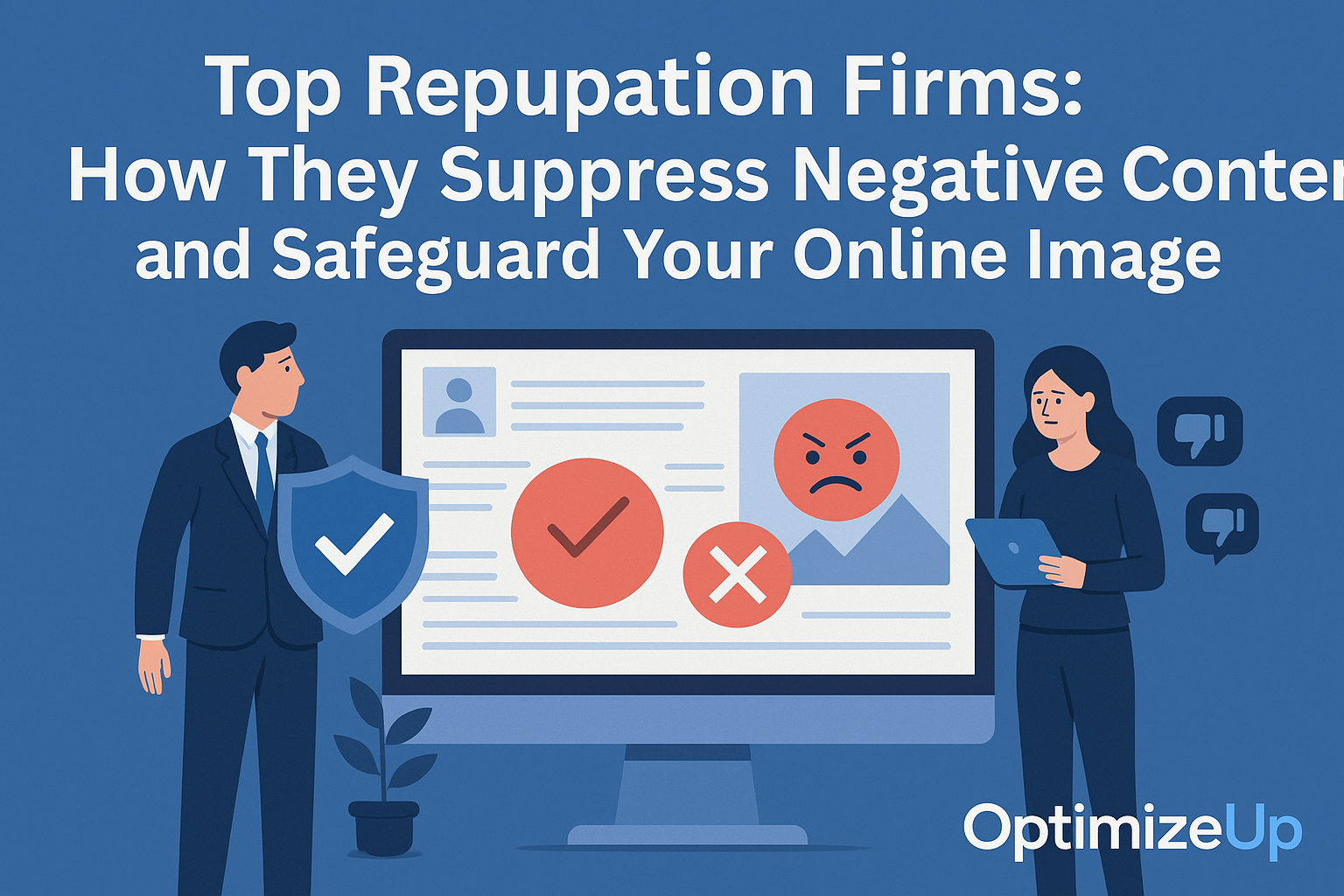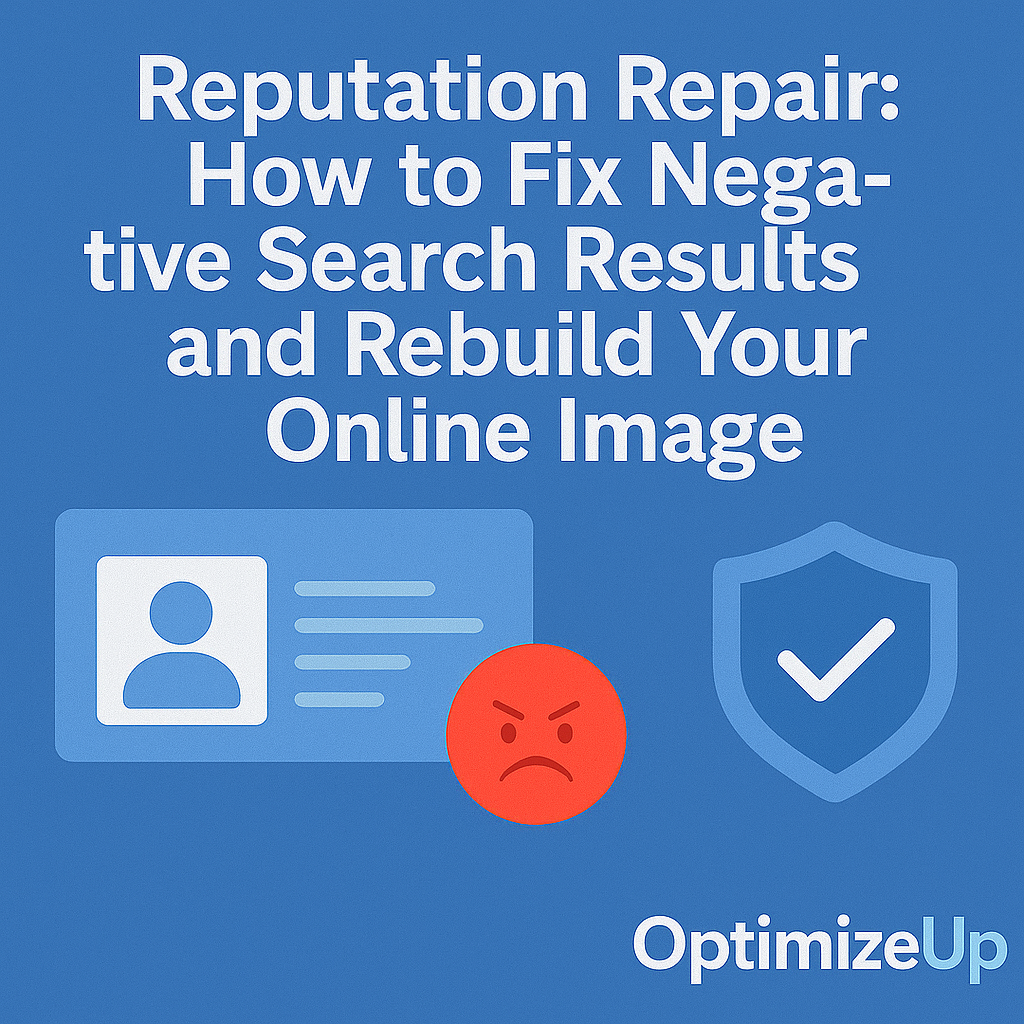Excerpt: Top reputation firms are redefining online image management by expertly suppressing negative content and building resilient brand authority. Learn how these experts protect personal and corporate reputations through legal strategies, SEO mastery, and proactive content development.
Recommended URL Slug: /top-reputation-firms-online-image-management
Meta Title: Top Reputation Firms: Suppress Negative Content & Protect Your Online Image
Meta Description: Discover how top reputation firms expertly suppress negative online content, enhance brand credibility, and protect your personal and business image. Learn key strategies and solutions.
The internet has become the first stop for background checks, hiring decisions, business partnerships, and even personal relationships. With 93% of online experiences starting with a search engine and 75% of users never scrolling past the first page of results, negative content can be devastating.
Reputation firms have emerged as critical allies for businesses, executives, and individuals aiming to protect and elevate their online identity. These firms utilize a multifaceted approach to monitor, manage, and improve how entities appear in search results, social media, forums, and review platforms.
Reputation firms go far beyond PR. They are hybrid agencies offering:
- Content Suppression
- Search Engine Optimization (SEO)
- Strategic Content Creation
- Review Management
- Crisis Response and Mitigation
- Legal Remedies (when applicable)
- Brand Monitoring and Sentiment Analysis
- Social Media Crisis Planning
Each strategy is designed to either remove, suppress, or replace undesirable content with authoritative, positive narratives.
1. Deindexing Harmful URLs
If a page violates search engine guidelines or privacy laws, reputation specialists can initiate a takedown or deindex request with platforms like Google. For example, Google’s content removal tool allows certain outdated or defamatory content to be removed from results.
The process often involves evaluating:
- Whether the content contains personally identifiable information
- If it’s no longer relevant or accurate
- If it violates data protection regulations (like GDPR in the EU or CCPA in California)
2. Reverse SEO Techniques
Reverse SEO is the process of pushing down negative search results by promoting positive or neutral content higher in rankings. Key elements include:
- Publishing high-quality, keyword-optimized blogs and press releases
- Backlink strategies to authority websites
- Web property diversification (e.g., building profiles on Crunchbase, Medium, and LinkedIn)
- Content freshness and regular posting to maintain SERP positioning
These efforts are long-term, requiring consistent strategy execution and domain authority cultivation.
3. Review and Complaint Management
Reputation firms monitor and respond to reviews across platforms like Google My Business, Yelp, Trustpilot, and the Better Business Bureau. They also work to remove fake or policy-violating reviews through:
- Filing with platform support
- Coordinating with legal teams
- Flooding negative content with genuine positive reviews
Advanced sentiment analysis tools also help flag emerging issues early, helping prevent potential damage from escalating.
4. Legal Action Against Defamation
While legal paths are a last resort, defamation, libel, and false claims are actionable. Reputation professionals may collaborate with legal counsel to issue cease and desist letters, file defamation suits, or seek court orders to compel content removal.
Successful litigation requires:
- Proof of false information
- Evidence of malicious intent or negligence
- Demonstration of reputational harm or lost opportunities
5. SEO-Dominant Asset Development
They create and rank positive assets such as:
- Personal or company websites
- Articles on news platforms
- Social media profiles and Wikipedia pages
- Guest blogs and podcast interviews
- Video content and explainer series on platforms like YouTube
These assets act as digital armor, pushing harmful content out of visibility while promoting a robust and trusted online presence.
6. Crisis Management Protocols
Top firms prepare clients for unforeseen crises with:
- Media response templates
- Social media escalation procedures
- Stakeholder communication plans
- Timely publishing of crisis communications and updates
Being prepared minimizes panic, preserves trust, and maintains reputation during difficult times.
7. Online Brand Construction and Identity Optimization
Building a strong brand identity reduces the likelihood of negative content impacting reputation. Firms help clients:
- Define brand tone, voice, and narrative
- Align all content with core values and mission
- Ensure consistency across all public-facing platforms
This proactive identity-building enhances search credibility and audience engagement.
Not all reputation firms deliver equal results. The most effective ones are defined by:
- Transparency in reporting and deliverables
- White-hat SEO and ethical tactics
- Proven track records with verifiable case studies
- Multi-disciplinary teams including SEO experts, attorneys, PR pros, and content strategists
- Clear communication and client education
- A measurable return on reputation investment (RoRI)
Firms like Optimize Up emphasize clarity, ongoing strategy, and long-term brand resilience.
Reputation firms employ a variety of tools to monitor and manage content:
- Google Alerts: Real-time monitoring of mentions
- BrandYourself: DIY reputation software
- Ahrefs & SEMrush: For backlink audits and keyword tracking
- Hootsuite & Sprout Social: Social listening and engagement tools
- Yext & Podium: Review and listing management
- BuzzSumo & Mention: For content virality and sentiment tracking
- Reputation.com Tools: Enterprise-level ORM analytics and reporting
These tools help firms stay proactive, not just reactive.
Suppression alone isn’t enough. The best firms focus on building a future-proof online presence. This includes:
- Publishing expert blogs
- Conducting interviews and podcast appearances
- Speaking engagements
- Getting featured in local and national media
- Curating authentic brand stories
- Active participation in community events and CSR initiatives
All these efforts contribute to what Google values: authority, trustworthiness, and relevance.
You might need a reputation firm if you are:
- A business suffering from poor reviews or old controversies
- An executive or public figure facing unfair coverage
- A professional experiencing personal attacks
- A job applicant or entrepreneur with a negative past result ranking high on Google
- A victim of revenge sites, mugshot listings, or defamatory forums
- An influencer or creator with brand deals affected by old content
- A nonprofit, school, or public institution facing online misinformation
The moment online content affects your opportunities or peace of mind, it’s time to consult a specialist.
Case A: The Small Business Bounce Back
A local restaurant received a flurry of negative reviews from a disgruntled former employee. A reputation firm successfully had the fake reviews removed and helped rebuild trust through press coverage and community outreach.
Case B: The Executive Comeback
A CEO was falsely accused in an article that ranked on page one. Through SEO suppression, content building, and legal requests, the firm buried the story beneath positive leadership content.
Case C: The Personal Reinvention
A man with an old mugshot faced social stigma. The firm helped remove the image from certain aggregators and built positive content to shift the narrative.
Case D: The Influencer Intervention
An influencer lost sponsorships due to resurfaced comments from a decade ago. A reputation firm helped issue a public apology, coordinated media outreach, and launched a rebranding campaign to regain public trust.
Optimize Up is a leader in this space, offering tailored solutions that combine:
- Comprehensive reputation audits
- Custom content and SEO roadmaps
- Review response and generation systems
- Discreet, white-glove service for executives and public figures
- 24/7 crisis monitoring and support
- Specialized solutions for professionals, creatives, and organizations
Their focus is not just to fix the problem, but to build lasting authority and resilience.
“Your online image should reflect your reality – not your past mistakes or someone else’s agenda.”
Explore more about Optimize Up’s services here.
Fees can range from $1,500/month to $20,000+ depending on the scope, urgency, and complexity.
No reputable firm will guarantee content removal unless it violates terms of service or is legally defamatory.
You may see initial results in 1-2 months, with full suppression or improvement taking 6-12 months.
Yes. The methods they use are legal if they comply with platform policies, privacy laws, and ethical SEO practices.
Look for reviews, past case studies, transparency in pricing, and a clear explanation of their approach.
Absolutely. Ongoing content creation and monitoring prevent issues before they arise.
Sectors like healthcare, finance, real estate, law, entertainment, and education particularly benefit due to high public visibility and strict compliance expectations.





